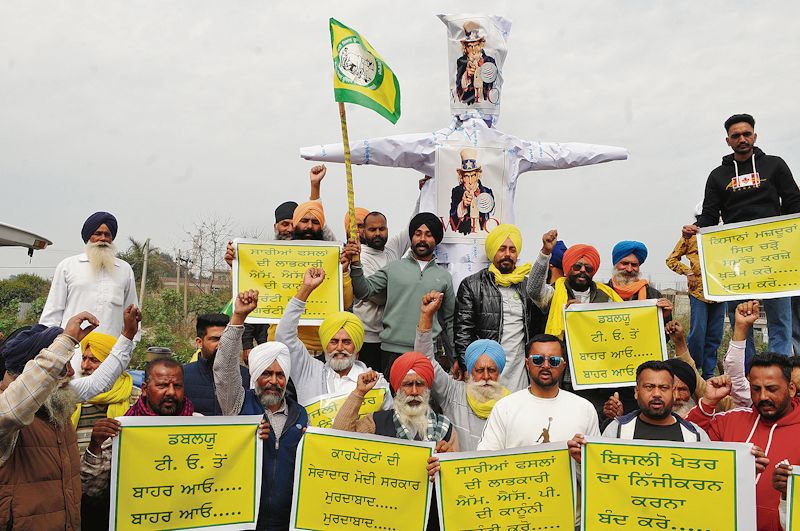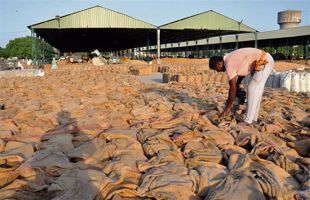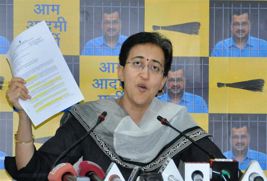
Upping the ante: Protesting farmers have reiterated the demand for India’s pullout from the WTO. ANI
Devinder Sharma
Food & Agriculture Specialist
THE world is witnessing an uprising by farmers in India and parts of Europe. Farmers in at least 65 countries have staged protests since January 2023. While the reasons behind the unprecedented wave of protests vary, the common thread is the failure of the unfettered market economy to sustain farming.
The words protesting farmers are using to vent their discontent may differ from one country/region to another, but the underlying message is the same: markets have failed to prop up farm incomes anywhere in the world. While in India, farmers want procurement at the minimum support price (MSP) as a legal right, European farmers are demanding the right value for their produce. The protests have also flagged the rising cost of production, cheaper imports and falling output prices in several countries in Europe, including Germany, France and Belgium, besides the potato price crash in Kenya and low vegetable prices in Nepal.
As farmers in Spain spilt 400,000 litres of milk on the streets, Malaysian growers protested against low paddy prices. In France, Confederation Paysanne, a prominent organisation of small farmers, at a recent meeting with President Macron, sought an assurance that no purchases would be allowed below a guaranteed agricultural price that included production cost plus remuneration for farmers and social protection.
Trade liberalisation, too, has come under attack. In Germany, France, Romania, Italy and Poland, farmers have staged protests against cheap imports coming from Ukraine, besides seeking a review of free trade agreements. They have blocked highways, stopped trucks carrying imported farm products and destroyed imported foodstuffs at many places. In France, thousands of farmers and fishermen have protested at ports against cheap fish imports, which they say are destroying farm livelihoods. In India, protesting farmers have reiterated their demand that India should pull out of the World Trade Organisation.
A compilation by Down to Earth magazine has shown that while 24 countries in Europe faced farmer protests, 12 in Africa, 11 in Asia, eight each in South America and North & Central America and two in Oceania have been shaken by farmer demonstrations in the past year. In Europe, a study on the latest round of protests in January-February 2024 by Euractiv, an independent pan-Europe media network, showed a strong demand for a fair and remunerative price for farmers, emanating mainly from France, Germany, Spain and Italy. Belgian farmers wanted protection in the food chain as well. Their anger was also directed at the strict environmental regulations that the European Commission is trying to impose in a bid to achieve net-zero emissions.
The impact of trade on the agricultural sector is a concern for EU farmers. German farmers’ demonstrations were focused on the withdrawal of tax exemptions on fuel for agricultural vehicles (which Berlin agreed to phase out), environmental regulations — especially the Nitrate Directive — and the demand for incentives to make up for low prices. In essence, most of these protests across continents were primarily against poor crop prices, high cost of production, cheaper imports and withdrawal of incentives, besides local issues.
Leaving agriculture in the hands of markets hasn’t helped the farm sector. The global outcry by farmers is a testimony to this. In any case, Indian agriculture has been a victim of a dominant economic thinking that has deliberately ensured that food prices are kept low so as to contain inflationary spirals. This is an outdated approach, and it’s time the Reserve Bank of India revisited its macroeconomic policies to bring them in tune with the changing realities. The Household Expenditure Survey for 2022-23 shows that the expenditure on food has significantly declined, even as every household is burdened with an ever-rising expenditure on housing, health and education, which doesn’t get adequately reflected in the consumption basket.
The moment you emphasise the urgency of a much-needed course correction, which will more or less free farm prices from tight macroeconomic control, a strong defiance emerges. It will lead to a higher inflation, and thereby market distortions, we are warned. This criticism is voiced whenever farmers reiterate the need for a guaranteed price. But the same economic thinking remained conspicuously quiet when a corporate rip-off resulted in inflation increasing by 57 per cent during the pandemic years and hovered around 53 per cent for the better part of 2023. Market distortions due to downright greed never sparked an outrage till economist Isabella M Weber from the University of Massachusetts cited ‘seller’s profit’ as the reason, which even the US President acknowledged in his recent State of the Union address and promised to initiate remedial action.
Coming back to the call for fixing the minimum farm prices, what has not been realised is that for several decades, numerous incentives and domestic support mechanisms have been attempted to stabilise farm prices, but the reality is that farm distress has only worsened globally. Even in the US, from where the market reforms in agriculture have been borrowed, a documentary titled Deja vu, directed by former NASA scientist Bedabrata Pain, shows how the free market design pushed small farmers out of agriculture, leaving behind a trail of misery and devastation on the farm.
A free market, therefore, is not the solution. It is, in fact, the reason behind the continuing farm crisis. If only markets had the wisdom and could reward efficiency, there is no reason why farming would be a losing proposition. Farmers’ revolt across the globe is a testimony to how flawed the economics has been. It’s time to radically overhaul the economic design that has deliberately kept farming impoverished.
A legalised MSP is the way forward not only for Indian farmers but also for growers across the globe. Markets will adjust accordingly.
Join Whatsapp Channel of The Tribune for latest updates.




























